MADRID, Spain — A new anti-obesity capsule could be on the horizon soon after a important breakthrough by scientists. Researchers in Spain say this new therapy would concentrate on immune cells referred to as macrophages — which can control a person’s metabolism according to the organ they reside in. In experiments with mice, the compound prevented the animals from attaining pounds, despite ingesting a substantial-fat food plan.
The remedy also staved off Form 2 diabetes and fatty liver condition. All a few are essential elements of metabolic syndrome. The Spanish group claims the finding opens the door to far better therapies for problems joined to obesity and metabolic syndrome, like cardiovascular disorder. It also opens the door to warding off diabetic issues and some cancers associated to excessive weight.
“In addition, our final results reveal a vulnerability of macrophages that contributes to chronic inflammatory disorders and that could be exploited therapeutically for the therapy of disorders involved with being overweight and metabolic syndrome, this kind of as cardiovascular sickness,” says review leader Dr. David Sancho, who heads the CNIC Immunobiology group, in a media launch.
Macrophages participate in an important position in the early reaction to microbial an infection. They also have a link to swelling, a physiological reaction that allows to mend destroyed tissue. However, if the inflammatory reaction does not operate properly, it can direct to continual swelling which triggers many circumstances – including weight problems, Type 2 diabetes, and coronary heart disease. Dr. Sancho and the team discovered the cells adapt to the needs of the distinct organ where they reside.
The discovery “gives us a greater knowing of how macrophages regulate their rate of metabolism according to the organ in which they reside,” Dr. Sancho points out.

These immune cells have a number of positions
Macrophages are ordinarily dispersed all over the entire body. They help cleanse organs of all forms of biological material that demands to be removed. These selection from harmful particles this sort of as mineral crystals or viruses to proteins or much larger complexes that arise in the course of advancement.
Macrophages are also crucial for taking away dead cells – fueling tissue renewal. The review in the journal Immunity reveals for the to start with time that they are really malleable.
“In tissues with ample extracellular excess fat and cholesterol, these kinds of as the lungs and spleen, macrophages adapt their fat burning capacity to degrade these fats through mitochondrial respiration,” claims examine to start with creator Dr. Stefanie Wculek. “Using genetic or pharmacological approaches to disrupt mitochondrial respiration, mitochondria can be eliminated from lung and spleen, while the macrophages in other organs, which really do not depend on mitochondrial respiration, endure.”
Yet another example is delivered by the macrophages located in physique body fat, or adipose tissue.
“Macrophages residing in the system fats of a particular person of normal fat are unaffected by mitochondria-disrupting therapies mainly because their metabolism is considerably less dependent on mitochondrial respiration. This is for the reason that the extra fat cells, termed adipocytes, are totally functional, leaving the macrophages in a resting point out,” Dr. Sancho points out.
“However, in obese individuals, the surplus body fat surpasses the potential of the adipocytes, and the resident macrophages turn out to be activated, changing into inflammatory cells that promote the advancement of insulin resistance, Sort 2 diabetes, and fatty liver.”
This change in adipose tissue macrophages also will make them vulnerable.
“The activated macrophages rely on mitochondrial respiration to procedure the surplus body fat, and this tends to make them vulnerable to therapeutic interventions, like pharmacological inhibitors of mitochondrial respiration,” Dr. Sancho concludes.
Obesity is commonly outlined as having a system mass index (BMI) of 30 or over. A BMI between 25 and 30 is classified as overweight.
South West Information Services writer Mark Waghorn contributed to this report.







